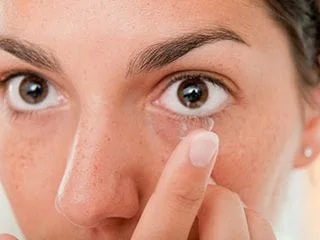
Daily Contact Lenses
Daily contact lenses are single use lenses that are removed and discarded at the end of each day. A new pair of lenses is then used the next morning. Replacing contact lenses more frequently can improve the health and comfort of your eyes, which is a big advantage to wearing daily contact lenses. Other benefits of daily contact lenses include that there is no lens cleaning required, there is no accumulation of lens deposits and no overnight wear. Your eye care professional can determine if daily contact lenses are right for you.
Monthly Contact Lenses
Monthly contacts are contacts worn for a month, or 30 days. Like daily contacts you will need to remove monthly contacts before bed, but monthly contact lenses can be placed in a cleaning solution to be worn the next day, for up to 30 days. Since fewer lenses are purchased with monthly contact lenses, monthly contacts are typically slightly lower in cost than daily contact lenses. Your eye care professional and determine if monthly contact lenses are right for you.
Hard to Fit Contact Lenses
A number of factors can prevent some people from wearing standard contact lenses.
Issues can include:
However, there are still contact lens options available. Hard to fit contact lenses are specialized lenses that adjust to irregular eye shapes, eye conditions, and challenging prescriptions.
Contact Lenses for Dry Eye
Dry eye can make it difficult for some patients to wear standard contact lenses. Gas permeable and hard gas permeable lenses are a good option for these dry eye patients. These contact lenses are made of a hard material that doesn’t dry out like soft contact lenses, which helps to retain moisture between the lens and the eye.
Contact Lenses for Severe Astigmatism
Severe astigmatism causes blurry vision because of an irregular cornea. This high level of astigmatism can make it hard for standard contact lenses to fit on the eye. Toric lenses are custom made to fit unique eye shapes and can correct high astigmatism. These lenses can be soft lenses or gas permeable lenses.
Contact Lenses for Keratoconus
Keratoconus occurs when the cornea thins and bulges outward in the shape of a cone. For this condition, scleral lenses or rigid gas permeable lenses are recommended because they prevent the cornea from continuing to push outward. Once the doctor identifies Keratoconus, if the patient is interested in contact lenses, your eye care professional will determine the best lens type and size for your needs.
Contact Lenses for Presbyopia
Presbyopia is a loss in near-focusing ability. This typically occurs in most people after the age of 40. Options for patients with presbyopia are available including bifocal and multifocal contacts lenses. These lenses allow for multiple prescriptions in one lens so that both the near and distance vision can be corrected.
Contact Lenses for Post-LASIK
Some patients continue to experience vision complications post-LASIK. In these situations, eye care professionals can determine if a hard to fit contact like a gas permeable lens will help reduce side effects like glare or halos around lights that may result after surgery.

